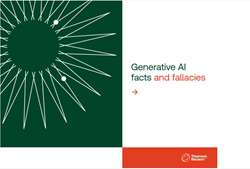
How would they know? (Image via Getty)
Today’s episode of “There’s No Way You Thought No One Would Notice This” stars a special guest whose name should be the touchstone example all future legal writing teachers use to make the point that plagiarism is a no-no. Not only can it cost you the respect of your readers, it can hit you where it really hurts — your wallet! From the ABA Journal:
A lawyer who copied part of her opponents’ motion into her own legal filing will have to pay more than $8,400 as sanctions, a federal judge in Pennsylvania has ruled. U.S. District Judge Gene E.K. Pratter of the Eastern District of Pennsylvania imposed the sanctions on lawyer Christine E. Munion in an Oct. 17 opinion and an Oct. 17 order.

Generative AI Facts And Fallacies
Four insights and misunderstandings to help demystify GenAI for legal professionals.
One of the shocking moments in the transition from legal writing in law school to legal writing in the real world is the realization that there is a lot of copying, pasting, and collaboration out there in those law firms. A yuuuuge caveat to this is that the copying and collaboration is usually done by people who are working together on the same or similar matters. Maybe you move a couple of words around, change the plaintiff or defendant names to the people you’re actually representing, things like that. Here, Munion decided to just bypass all of those traditional caveats to the “no copying from someone else’s homework” rule.
The copying was “neither slight nor subtle,” Pratter said.
On the day of the deadline, Munion filed her own motion to exclude lay-opinion testimony by the two plaintiffs, Gene Stilp and Stephen Connolley. She cited the same reasons as the plaintiffs did, but the similarities didn’t end there, Pratter wrote. Nearly every paragraph of Munion’s motion and brief “contain language lifted word for word” from the plaintiffs’ motion, the judge said.
Pratter said the plagiarism was apparent because Munion even included the plaintiffs’ editing errors—two missing closed quotation marks and a missing space. In some instances, she also failed to change the names of the parties.
Pratter said Munion had admitted to the copying and acknowledged responsibility “once it became clear that all escape routes were foreclosed.”
Much like getting caught insulting opposing counsel, you gain no cool points by admitting you stole someone else’s thoughts and words by admitting you got caught only because there was no plausible deniability left. Missing deadlines sucks, but trust me — it is far less embarrassing to get caught asking for an extension than it is hoping that your colleagues didn’t read that article about you in Above the Law.

Billables Are Not The Same As Cash Flow. Here’s Why That’s Important.
Findings from the MyCase 2025 Legal Industry Report.
To readers, students, and lawyers alike, I leave you with the judge’s conclusion:
“The practice of law is not easy; it demands thorough research and writing, nearly always on a deadline,” Pratter wrote. “A quick turnaround does not excuse a lawyer’s ethical duties to the court, and there is never an excuse for appropriating the work of another lawyer—let alone opposing counsel—and presenting it as one’s own.”
Lawyer Is Sanctioned For Lifting Passages From Opponents’ Motion; Copying Was ‘Neither Slight Nor Subtle’ [ABA Journal]
 Chris Williams became a social media manager and assistant editor for Above the Law in June 2021. Prior to joining the staff, he moonlighted as a minor Memelord™ in the Facebook group Law School Memes for Edgy T14s. He endured Missouri long enough to graduate from Washington University in St. Louis School of Law. He is a former boatbuilder who cannot swim, a published author on critical race theory, philosophy, and humor, and has a love for cycling that occasionally annoys his peers. You can reach him by email at [email protected] and by tweet at @WritesForRent.
Chris Williams became a social media manager and assistant editor for Above the Law in June 2021. Prior to joining the staff, he moonlighted as a minor Memelord™ in the Facebook group Law School Memes for Edgy T14s. He endured Missouri long enough to graduate from Washington University in St. Louis School of Law. He is a former boatbuilder who cannot swim, a published author on critical race theory, philosophy, and humor, and has a love for cycling that occasionally annoys his peers. You can reach him by email at [email protected] and by tweet at @WritesForRent.